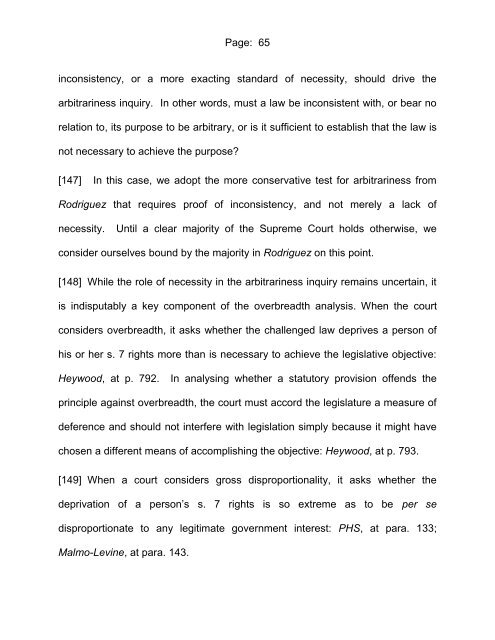Canada (Attorney General) v. Bedford, 2012 ONCA ... - York University
Canada (Attorney General) v. Bedford, 2012 ONCA ... - York University
Canada (Attorney General) v. Bedford, 2012 ONCA ... - York University
You also want an ePaper? Increase the reach of your titles
YUMPU automatically turns print PDFs into web optimized ePapers that Google loves.
Page: 65inconsistency, or a more exacting standard of necessity, should drive thearbitrariness inquiry. In other words, must a law be inconsistent with, or bear norelation to, its purpose to be arbitrary, or is it sufficient to establish that the law isnot necessary to achieve the purpose?[147] In this case, we adopt the more conservative test for arbitrariness fromRodriguez that requires proof of inconsistency, and not merely a lack ofnecessity.Until a clear majority of the Supreme Court holds otherwise, weconsider ourselves bound by the majority in Rodriguez on this point.[148] While the role of necessity in the arbitrariness inquiry remains uncertain, itis indisputably a key component of the overbreadth analysis. When the courtconsiders overbreadth, it asks whether the challenged law deprives a person ofhis or her s. 7 rights more than is necessary to achieve the legislative objective:Heywood, at p. 792.In analysing whether a statutory provision offends theprinciple against overbreadth, the court must accord the legislature a measure ofdeference and should not interfere with legislation simply because it might havechosen a different means of accomplishing the objective: Heywood, at p. 793.[149] When a court considers gross disproportionality, it asks whether thedeprivation of a person‟s s. 7 rights is so extreme as to be per sedisproportionate to any legitimate government interest: PHS, at para. 133;Malmo-Levine, at para. 143.
















